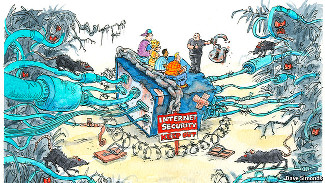

Photo Credit: Dave Simonds
By The Economist
Security guards (at least the good ones) are paid to be paranoid. Computer-security researchers are the same. Many had long suspected that governments use the internet not only to keep tabs on particular targets, but also to snoop on entire populations. But suspicions are not facts. So when newspapers began publishing documents leaked by Edward Snowden, once employed as a contractor by America’s National Security Agency (NSA), the world’s most munificently funded electronic spy agency, those researchers sat up.
They were especially incensed by leaks published in September by the Guardian and the New York Times, which suggested that American spooks (with help from their British counterparts) had been working quietly for years to subvert and undermine the cryptographic software and standards which make secure communication over the internet possible. “At that point”, says Matthew Green, a cryptographer at Johns Hopkins University, “people started to get really upset.”
